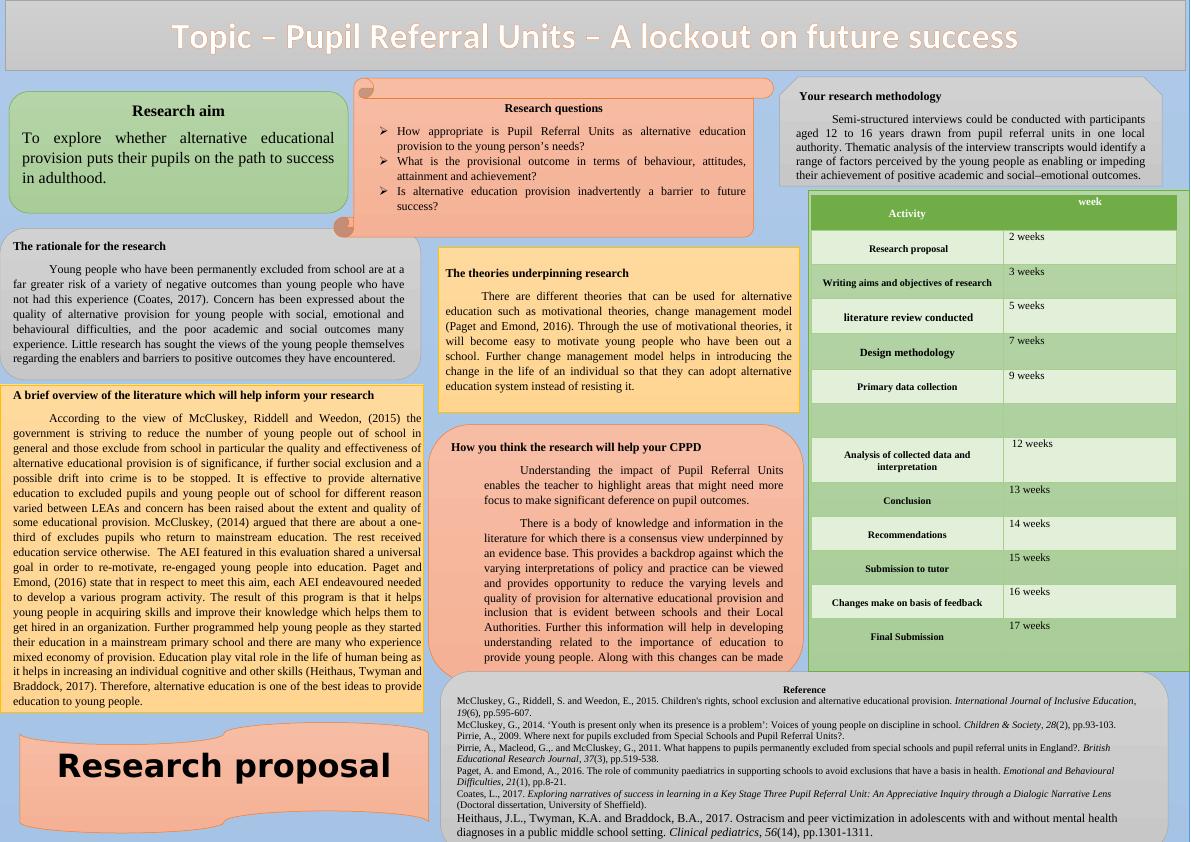Ask a question from expert
The Theories Underpinning Research
1 Pages2136 Words159 Views
Added on 2020-06-06
The Theories Underpinning Research
Added on 2020-06-06
BookmarkShareRelated Documents
The theories underpinning researchThere are different theories that can be used for alternativeeducation such as motivational theories, change management model(Paget and Emond, 2016). Through the use of motivational theories, itwill become easy to motivate young people who have been out aschool. Further change management model helps in introducing thechange in the life of an individual so that they can adopt alternativeeducation system instead of resisting it.Activityweek Research proposal2 weeksWriting aims and objectives of research 3 weeks literature review conducted5 weeksDesign methodology7 weeksPrimary data collection 9 weeksAnalysis of collected data andinterpretation 12 weeksConclusion13 weeksRecommendations14 weeksSubmission to tutor 15 weeksChanges make on basis of feedback16 weeksFinal Submission17 weeks Your research methodologySemi-structured interviews could be conducted with participantsaged 12 to 16 years drawn from pupil referral units in one localauthority. Thematic analysis of the interview transcripts would identify arange of factors perceived by the young people as enabling or impedingtheir achievement of positive academic and social–emotional outcomes.ReferenceMcCluskey, G., Riddell, S. and Weedon, E., 2015. Children's rights, school exclusion and alternative educational provision. International Journal of Inclusive Education, 19(6), pp.595-607.McCluskey, G., 2014. ‘Youth is present only when its presence is a problem’: Voices of young people on discipline in school. Children & Society, 28(2), pp.93-103.Pirrie, A., 2009. Where next for pupils excluded from Special Schools and Pupil Referral Units?.Pirrie, A., Macleod, G.,. and McCluskey, G., 2011. What happens to pupils permanently excluded from special schools and pupil referral units in England?. British Educational Research Journal, 37(3), pp.519-538.Paget, A. and Emond, A., 2016. The role of community paediatrics in supporting schools to avoid exclusions that have a basis in health. Emotional and Behavioural Difficulties, 21(1), pp.8-21.Coates, L., 2017. Exploring narratives of success in learning in a Key Stage Three Pupil Referral Unit: An Appreciative Inquiry through a Dialogic Narrative Lens(Doctoral dissertation, University of Sheffield).Heithaus, J.L., Twyman, K.A. and Braddock, B.A., 2017. Ostracism and peer victimization in adolescents with and without mental health diagnoses in a public middle school setting. Clinical pediatrics, 56(14), pp.1301-1311.Research proposal A brief overview of the literature which will help inform your researchAccording to the view of McCluskey, Riddell and Weedon, (2015) thegovernment is striving to reduce the number of young people out of school ingeneral and those exclude from school in particular the quality and effectiveness ofalternative educational provision is of significance, if further social exclusion and apossible drift into crime is to be stopped. It is effective to provide alternativeeducation to excluded pupils and young people out of school for different reasonvaried between LEAs and concern has been raised about the extent and quality ofsome educational provision. McCluskey, (2014) argued that there are about a one-third of excludes pupils who return to mainstream education. The rest receivededucation service otherwise. The AEI featured in this evaluation shared a universalgoal in order to re-motivate, re-engaged young people into education. Paget andEmond, (2016) state that in respect to meet this aim, each AEI endeavoured neededto develop a various program activity. The result of this program is that it helpsyoung people in acquiring skills and improve their knowledge which helps them toget hired in an organization. Further programmed help young people as they startedtheir education in a mainstream primary school and there are many who experiencemixed economy of provision. Education play vital role in the life of human being asit helps in increasing an individual cognitive and other skills (Heithaus, Twyman andBraddock, 2017). Therefore, alternative education is one of the best ideas to provideeducation to young people.The rationale for the researchYoung people who have been permanently excluded from school are at afar greater risk of a variety of negative outcomes than young people who havenot had this experience (Coates, 2017). Concern has been expressed about thequality of alternative provision for young people with social, emotional andbehavioural difficulties, and the poor academic and social outcomes manyexperience. Little research has sought the views of the young people themselvesregarding the enablers and barriers to positive outcomes they have encountered. How you think the research will help your CPPDUnderstanding the impact of Pupil Referral Unitsenables the teacher to highlight areas that might need morefocus to make significant deference on pupil outcomes.There is a body of knowledge and information in theliterature for which there is a consensus view underpinned byan evidence base. This provides a backdrop against which thevarying interpretations of policy and practice can be viewedand provides opportunity to reduce the varying levels andquality of provision for alternative educational provision andinclusion that is evident between schools and their LocalAuthorities. Further this information will help in developingunderstanding related to the importance of education toprovide young people. Along with this changes can be madein practices so that more improvement can be made inResearch questionsHow appropriate is Pupil Referral Units as alternative educationprovision to the young person’s needs?What is the provisional outcome in terms of behaviour, attitudes,attainment and achievement?Is alternative education provision inadvertently a barrier to futuresuccess?Research aimTo explore whether alternative educationalprovision puts their pupils on the path to successin adulthood.Topic – Pupil Referral Units – A lockout on future success

End of preview
Want to access all the pages? Upload your documents or become a member.